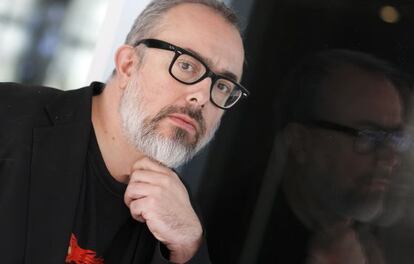Witchfinder general
As he jumps on his broomstick for new film 'Witching & Bitching,' Alex de la Iglesia says he's learnt the key to directing is taking charge and enjoying the ride

When word started to spread that Alex de la Iglesia was involved in a project about the witches of Zugarramurdi — site of notorious witch trials in 1610 which saw scores imprisoned and 40 burnt in a massive auto da fe — it sounded like the perfect fit for the man who in 1995's The Day of the Beast imagined Madrid's leaning Torres Kio as the stage for the appearance of the Antichrist. Witches covens in the caves of lush mountains, six women accused of witchcraft burnt alive by the Inquisition and all barely 200 kilometers away from the Basque director's birthplace. "In the Basque Country, the witches, or sorgines, are very present," he explains. "My father used to tell me about Zugarramurdi. And studying at university, I got into the Inquisition trials and the world of witches, mixed with Basque cultural anthropology. [...] I studied philosophy in Deusto, and one of the most important demonology collections in the world is there."
Not that anyone is expecting an accurate historical representation of the facts from Las brujas de Zugarramurdi, or Witching & Bitching, as it is known in English, which is set to be shown out of competition at this year's San Sebastián Film Festival later this month. The film begins with a raid on a gold-buying store in Madrid's Puerta del Sol by thieves, played by Hugo Silva and Mario Casas, disguised as human statues. They get away with a suitcase containing 25,000 rings and, pursued by two policemen (Pepón Nieto and Secun de la Rosa) and Silva's wife (Macarena Gómez), end up in Zugarramurdi, in the hands of a family comprising three generations of witches, played by Terele Pávez, Carmen Maura and Carolina Bang.
The director says that in terms of the work he achieved with the actors, this is the film that has made him most proud. "Alex has that ability of great directors to make everything seem under control," says Casas, who shows an unexpected gift for comedy in the film. "He respected me, he trusted in me and he gave me wings."
The key to achieving the atmosphere, De la Iglesia explains, was an idea that Bang, who is also his partner, had. "She created a WhatsApp group that included all the actors," he explains. "And suddenly, they were all talking among themselves about what they had done, of what they thought about each scene. Suddenly, we lost all our fear. It wasn't the typical 'the director wants this and the actors defend their character' - the kind of confrontations that occur when directing actors. Thanks to that tiny thing, I realized that the relationship between the actors is essential. Nothing inspired fear, nothing was frightening."
On Twitter you talk to people who detest you, your films and all you represent"
It has taken De la Iglesia 25 years in the business to understand that his foremost quality as a director is his professionalism. "Directing is about getting control of a group of people and meeting a schedule," he explains. "And that is what I am most proud of. What I am best at is time management, and I think that is the first job of a director. I know how to get certain results with what I have. You put yourself here; you, here; the camera, here. I have got a lot of things wrong: as an artist, as a person... But not this. I am good at it, and it is something I have learned making movies. This has an important application in real life. As my director of photography, Kiko de la Rica, says: "He who hesitates is lost." I hate people who think too much. I'm more a doing person. I'm annoyed by people who spend hours thinking where we are going to go for dinner. To an Italian, to a Japanese... and suddenly it is 11.30pm and you say, 'You sons of bitches, we haven't gone anywhere! We're going to the first place we see!' It just doesn't matter. It doesn't matter what restaurant you're in if you're with your friends. If it's bad, it's more fun, as you can moan. And if it's good, you've found a legendary place."
With a photo of his sausage dog and the phrase "A guy who makes films" as his profile, De la Iglesia remains very active on Twitter. "The good thing about Twitter is that it puts you in the real world. You talk to people who detest you, your films and everything you represent. And that's good. You have to know what you're up against. The creative process can be isolating. But in other fields, like literature, much more so. I communicate with 150 people every day. And that destroys you psychologically, but it is very good for work. The moment you isolate yourself, you die."
De la Iglesia says he's happy about facing the tough challenges that technology is bringing to the industry. "In a short time everyone will be able to make Superman on their computer at home," he says. "And that's fine. Let them put all of us in our place. We are not that important." Times change, but cinema, he says, stays the same. "The catastrophe that the internet is creating could be good for us if we are intelligent enough to deal with it. It is something that's going to happen, and I hope to be there to experience it."
Tu suscripción se está usando en otro dispositivo
¿Quieres añadir otro usuario a tu suscripción?
Si continúas leyendo en este dispositivo, no se podrá leer en el otro.
FlechaTu suscripción se está usando en otro dispositivo y solo puedes acceder a EL PAÍS desde un dispositivo a la vez.
Si quieres compartir tu cuenta, cambia tu suscripción a la modalidad Premium, así podrás añadir otro usuario. Cada uno accederá con su propia cuenta de email, lo que os permitirá personalizar vuestra experiencia en EL PAÍS.
¿Tienes una suscripción de empresa? Accede aquí para contratar más cuentas.
En el caso de no saber quién está usando tu cuenta, te recomendamos cambiar tu contraseña aquí.
Si decides continuar compartiendo tu cuenta, este mensaje se mostrará en tu dispositivo y en el de la otra persona que está usando tu cuenta de forma indefinida, afectando a tu experiencia de lectura. Puedes consultar aquí los términos y condiciones de la suscripción digital.









































